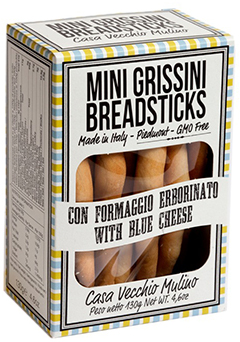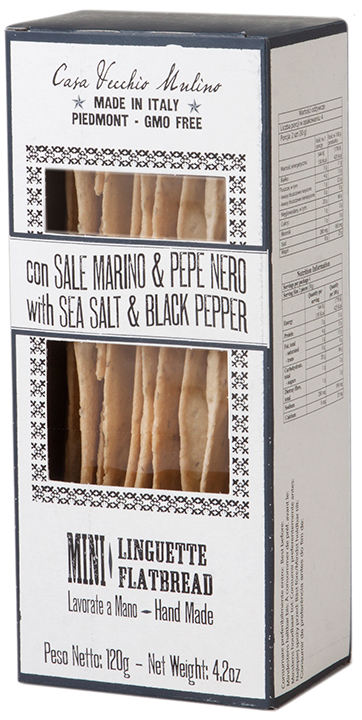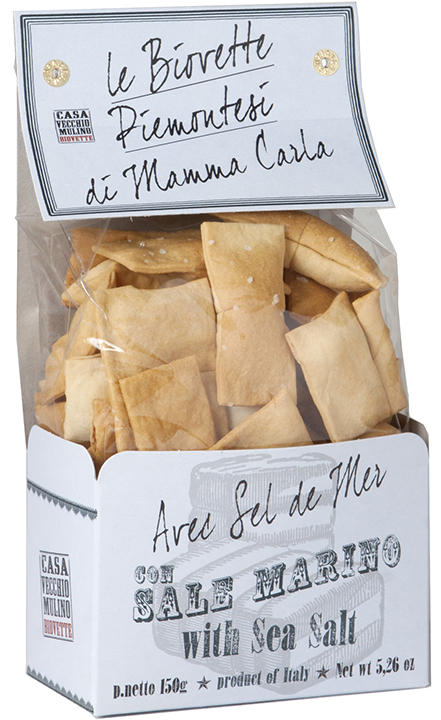- About us
- Company details
A small family-run artisanal company located in Carmagnola, a town near Turin and with a history dating back to 1860,our activity has been passed down through four generations.
Working diligently to maintain the handmade techniques and traditions inherited from our grandparents, while embracing modern practices, Casa Vecchio Mulino strive to uphold old baking traditions and craft.
Committed to using high-quality and genuine raw materials, we continuously research and source the finest ingredients, resulting in a product that stands apart from mass-produced alternatives. Our dedication to authenticity and the unique flavours of sets us apart.
Over the years, our products have gained popularity not only locally but also in markets worldwide. A great success story of heritage, tradition and innovation.
Year of establishment:
1994
Number of employees:
FROM 10 TO 19 EMPLOYEES
Annual turnover:
between 2.5 and 5 million Euro
Reference year of turnover:
2014
Export turnover:
Not available
Activities:
Manufacture of bread; manufacture of fresh pastry goods and cakes
Manufacture of bread and similar products
Manufacture of fresh pastry goods and cakes
Manufacture of rusks, biscuits, preserved pastries and cakes
Manufacture of farinaceous products
- Videos
- Catalogue
No videos uploaded
No documents uploaded
- Contact Information
- Business Proposals
Company:
ANTROPOS S.R.L.
Web site:
Address:
VIA TEGLIA 20
City:
CARMAGNOLA (TO)
Zip Code:
10022
Social media:
Tag:
No business proposals uploaded
- Map
Breadsticks Rubatà

Bread-sticks are a kind of fine bread, with the shape of thin sticks, made only with very natural ingredients and rolled still by hand. They could be a good alternative to bread during meals or just as snacks during the day.
It seems they were invented in XVII century (1679-1698) by a the tourinese baker Antonio Brunero, at the request of Carlo Emanuele, who convoked the Mayors, two Senators, two Councilman and four bakers and asked them to create a better bread, healthy and well-browned. Messer Antonio Brunero invented a biscuit-bradstick and called it “ghersino”
These breadsticks were providential for the recovery of the ill sun of Duke of Savoia ; on indication of the doctor Tebaldo Pecchio di Lanzo, the boy ate only breadsticks for some time. He got well and he became Vittorio Emanuele II the King.
Web site
https://vecchiomulino.to.it/it/
Mini Breadsticks

Casa Vecchio Mulino Mini Breadsticks are a type of artisanal bread characterised by their slender stick-like shape. They are crafted using only the finest natural ingredients and are carefully rolled by hand.
These breadsticks serve as a delightful alternative to regular bread, whether enjoyed during meals or as a satisfying snack throughout the day. Their crunchy texture and savoury flavour make them a favourite choice by many.
A little note:
The grissini, a typical product from Piedmont, even though made with simple ingredients, requires great skill in the proportions that are used as well as a personal ability in which Piedmontese bakers excel.
Web site
https://vecchiomulino.to.it/it/
Mini Flatbreads

Thin, handcrafted breads baked to a delightful crispness. Made with simple, natural ingredients such as flour, water, salt, and the finest extra virgin olive oil, they offer a delicious and excellent alternative to traditional bread. Their versatility makes them the perfect accompaniment to antipasto and cheese boards.
A little note:
In the region of Piedmont, Italy, these flatbreads are also known as "Lingue di suocera," which translates to "mother-in-law's tongues." This name is likely derived from the shape and length of the bread, which may resemble the tongues of mothers-in-law. Historical records indicate that master bakers in this region have been producing these flatbreads since the 17th century, showcasing the rich baking heritage of Piedmont.
Web site
https://vecchiomulino.to.it/it/
Biovette piemontesi di Mamma Carla

Casa Vecchio Mulino Biovette are small, square-shaped breads that offer a delightful combination of crispness, flavour, and fragrance. Each piece is carefully crafted by hand and allowed to rise for several hours at room temperature. The traditional manufacturing process, along with the use of top-quality natural ingredients such as the finest extra virgin olive oil, results in a product that captures the aroma and taste of freshly baked bread.
Biovette can be enjoyed as they are, offering a simple yet satisfying snack. Alternatively, they make an excellent substitute for traditional bread, particularly when paired with appetisers, allowing you to savour the flavours and enhance your dining experience.
A little note:
The name "Biovette" is derived from the Italian word "Biova," which refers to a traditional loaf of bread from the Piedmont region. These loaves were known for their unique characteristics of being airy and hollow on the inside, while offering a satisfying crunch on the outside. The Biovette, inspired by this tradition, captures the essence of these qualities, providing a delightful combination of lightness, crunchiness, and a delicate taste.
Web site
https://vecchiomulino.to.it/it/


